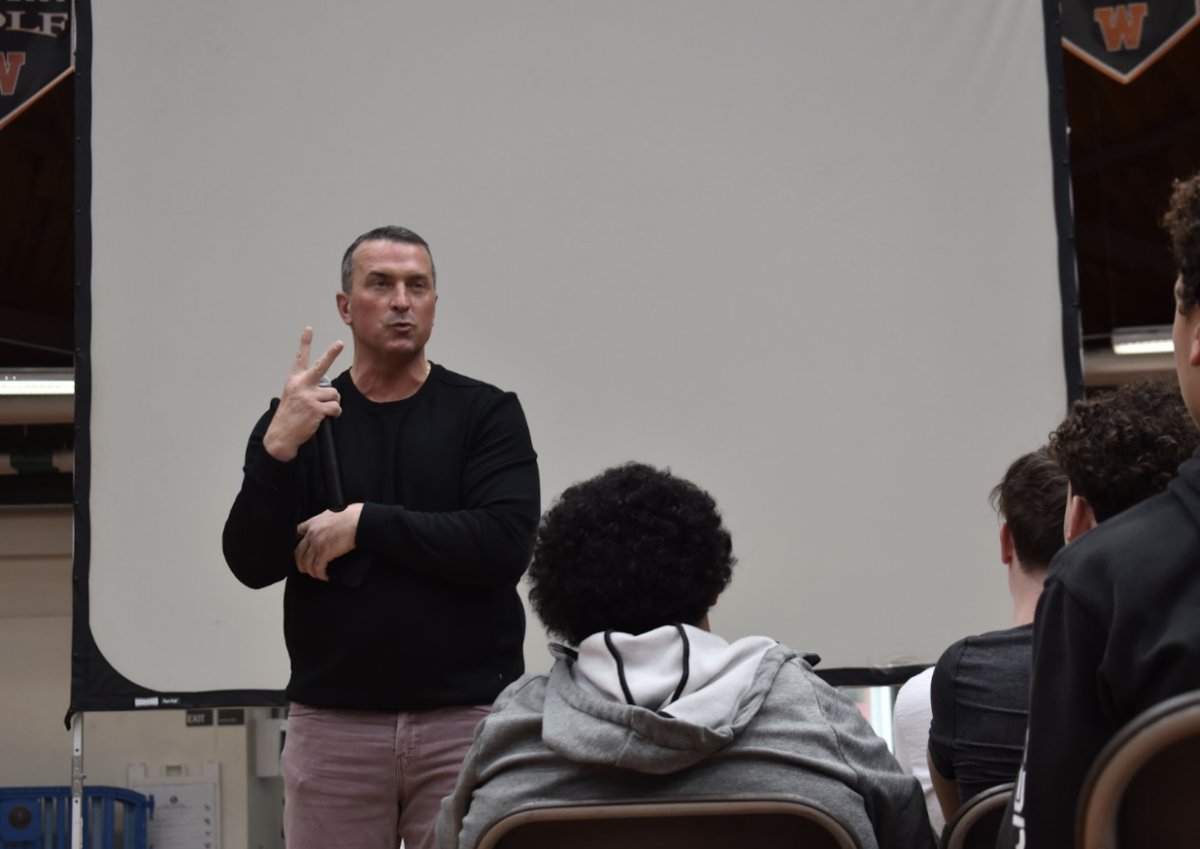On April 7, former basketball player Chris Herren spoke to Wayland High School students on his recovery from substance use disorder (SUD). Herren has shared his experience with drug addiction and recovery for over a decade, speaking to approximately two million people throughout his career. Herren spoke to the Wayland community twice, once in the Field House during the school day to WHS students and then to the general public at 7 p.m. in the WHS theater.
“I thought it was a very honest and compelling presentation,” Principal Allyson Mizoguchi said. “He made it clear for everybody in the Field House what the impact of addiction is on family and friends, and also the importance of having a caring community around you when you are struggling with any sort of issue. Whether it’s addiction, or lack of self esteem or mental health issues, the imperative part is to have a community that’s going to be able to support you and help you.”
Before his speech, WHS students watched a 20 minute documentary about Herren’s life that detailed his experience and explained to students how he got to where he is now.
Herren was born in Fall River, Massachusetts in 1975. There, he played basketball for Durfee High School, and from the ages of 16 to 18 he was considered one of the best high school basketball players in the country. Not everything was as perfect as it seemed, though. Herren had explored alcohol and drugs during his time in high school, and his ever-growing dependence had set in place a ramping addiction.
However, Herren was still able to play, and he went to Boston College to begin his college basketball career. He played for Boston College until his junior year when he was transferred to Fresno State as a result of failed drug tests. He played at Fresno until he was drafted by the Denver Nuggets in 1999. During this time he was introduced to OxyContin, a powerful narcotic with a high risk of addiction.
In 2000, Herren was traded again, this time to the Boston Celtics. To the public, this seemed like an absolute dream come true: a New England-raised star athlete getting the opportunity to play back home. In reality, this change proved to be detrimental to Herrens health and wellbeing. The drug scene in Boston was booming compared to Denver, and soon after moving, Herren was quickly introduced to heroin.
Herren quickly developed a heroin addiction. Surprisingly, he was still able to play exceptionally under the influence, but couldn’t play without using the drug, leading to a vicious cycle of substance abuse.

When people in his life found out about Herren’s addiction, they sent him to rehab. From there, he struggled with a relapse after he left to meet his newborn son. After this relapse, he returned to rehab for a year, disconnecting from his loved ones in an effort to not hurt them and to make a full recovery.
After his time in the rehab center, Herren had been sober for 7-8 months. He realized he needed a job, so he started coaching and speaking about his experience with addiction.
Herren began his speech at WHS by talking about his personal experience with substance use. He said he found coaching children’s basketball as a beneficial way to give back to the community.
“I spoke to a friend of mine in recovery and he suggested that I teach basketball,” Herren said. “I believe every kid deserves to play. Every kid deserves to feel good about themselves.”
Herren says he wished he asked his mom or guidance counselor about his drug use when he was a teen and using drugs. When using drugs as a teen, he felt guilty deceiving his family and disappointing the people who worked hard for him.
“My poor mom doesn’t even know the real me anymore,” Herren said on alcohol consumption as a teenager. “I’m 17 years old and one of the best basketball players in this country. And I don’t like being me anymore.”
Some people may think that substance use can be a one-time experience, however numerous studies have shown that use can cause stress. Because WHS is a highly competitive school in sports and academics, students are surrounded by a number of stressful factors that could potentially elicit addiction.
“Grades and sports are taken super seriously, and it doesn’t seem like there’s any sort of relief for that,” junior Nathan Tobe said. “This is kind of a problem because people don’t want to seem like they aren’t good enough and that they can’t handle it, so it leads to a compartmentalization and bottling up of so many things.”
After using addictive substances even just once, physical brain changes begin to take place, and the use of willpower for recovery slips out of reach. This is the beginning of a SUD, which affects over 46 million people across the US.
But how does one simple occasion of use lead to a cycle of addiction? According to Yale Medicine, substance use stimulates the brain’s reward circuit. After feeling a sensation of euphoria or pleasure, the brain will remember this feeling and will desire it. As this progresses, the body will start to build up a tolerance. In other words, larger and larger amounts of substances will be needed to fulfill the dependence on a rush of dopamine. This can be one of the factors that causes individuals to move from using less harmful drugs, often referred to as gateway drugs such as marijuana, to illegal substances like cocaine or heroin.
Having experienced this slippery spiral of substance use is what inspires Herren to reach out to youths and guide them away from that dangerous path.

In 2018, Herren built a rehab recovery center in Seekonk, MA, Herren Wellness. The recovery center’s main goal is to create a safe and helpful environment for people struggling with SUDs. Herren’s mission is to supply helpful wellness recovery services that will make a difference in the lives of individuals and their families, while respecting the experiences of people from a variety of backgrounds.
To help reach this goal, Herren also utilizes his voice and enriches the public as a motivational speaker. When he gives speeches, he targets high schoolers for his audience because he mentioned how a number of patients at Herren Wellness are teenagers and young adults. By talking to high schoolers about his experiences and answering the questions they have, he leaves listeners with an important warning about the harm and effect substance abuse has on a person’s life, and valuable insight on the delicate relationship between mental health and addiction.
“Everybody thinks this talk is about drugs and alcohol, [but] I think it’s about self-esteem,” Herren said. “I think it’s about how you really feel about you. I think it’s about the kid you pretend to be all of a sudden.”





![Last Wednesday, the Wayland School Committee gathered to discuss a number of topics regarding the health curriculum and Innovation Career Pathway course. Another large topic of conversation was the ways to potentially mitigate distracting cell phone usage. "These [phones] are going to distract your learning and social relationships," Superintendent David Fleishman said. "That's concrete right there."](https://waylandstudentpress.com/wp-content/uploads/2025/06/Screenshot-2025-06-04-at-9.49.31 PM-1200x886.png)




























